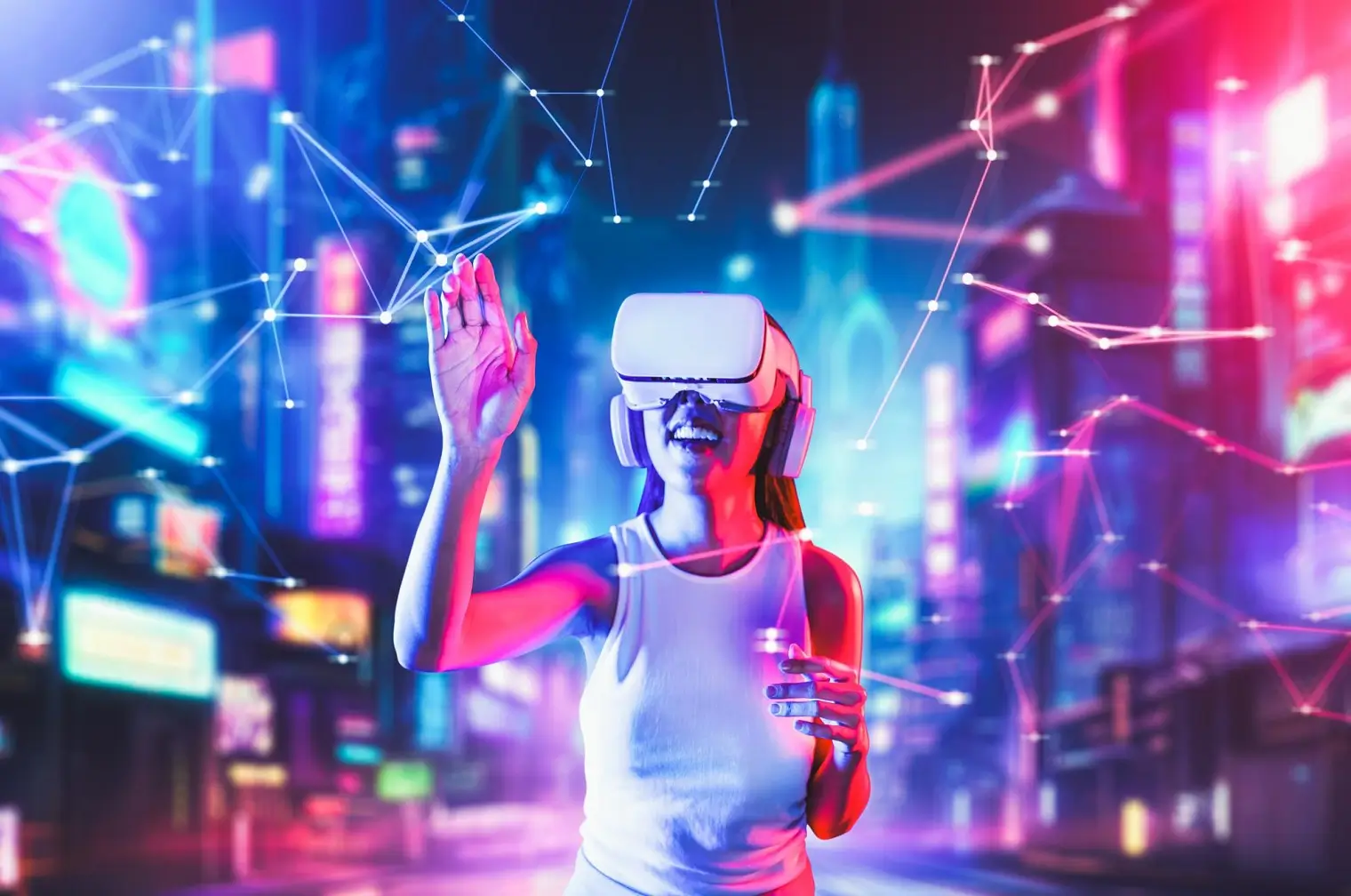The concept of marketing in the metaverse has now become a new thing for businesses to connect with consumers in immersive, virtual environments. The Metaverse, a collective virtual space that merges augmented reality (AR), virtual reality (VR), and blockchain technologies, is transforming how brands engage with their audiences.
By 2030, the global metaverse market is expected to reach $936.6 billion. This growth shows an opportunity for marketers and businesses to take advantage of virtual worlds and create unique, interactive experiences for end-users.
The metaverse has become a new digital space where companies can build brand presence, host virtual events, and even sell digital goods. Brands such as Nike, Coca-Cola, and Gucci have already launched innovative campaigns within these virtual spaces. To become future-ready, marketing in the metaverse is important today and companies like ViitorCloud can help businesses with that. Let’s discuss this concept in detail.
Why Marketers/Businesses Should Care About the Metaverse
The adoption of immersive digital experiences is reforming consumer behavior, particularly among Millennials and Gen Z. These younger generations are highly engaged with platforms like Roblox, Fortnite, and VR environments. They spend more time in virtual worlds, socializing, shopping, and attending virtual events.
For instance, Roblox has over 79.5 million daily active users, with 60% of them using the platform for non-gaming activities such as shopping. This growing engagement highlights the importance of targeting these key demographics through metaverse marketing.
Moreover, technologies like virtual reality (VR) and augmented reality (AR) are playing a crucial role in shaping consumer behavior. AR allows users to visualize products in their real-world environment before making a purchase decision. For example, the IKEA Place app lets customers place virtual furniture in their homes.
Similarly, non-fungible tokens (NFTs) are revolutionizing digital ownership by allowing consumers to buy exclusive digital assets tied to brands. These technologies enable marketers to create personalized and immersive experiences that resonate deeply with tech-savvy consumers.
Explore New Opportunities with Metaverse Marketing!
Embrace the future of marketing in the metaverse and connect with your audience in immersive ways. Discover our Metaverse Services & Solutions to elevate your brand today.
Important Metaverse Marketing Strategies
As brands venture into the metaverse, several key strategies are important and effective for marketing in the metaverse:
1. Native Advertising
Native advertising refers to seamlessly integrating brand elements within existing virtual environments without disrupting the user experience. A prime example is Deliveroo’s campaign on Animal Crossing, where players received surprise deliveries from virtual riders along with promo codes redeemable in real life. This campaign garnered over three million in-game engagements within its first hour.
2. Digital Collectibles and NFTs
Brands are increasingly using NFTs to offer exclusive digital collectibles that enhance brand loyalty. For instance, Nike’s Nikeland on Roblox allows users to purchase digitized Nike gear for their avatars. Similarly, Budweiser has launched limited-edition NFT beer cans that grant owners access to exclusive content and events.
3. Direct-to-Avatar (D2A) Economy
The D2A economy refers to selling virtual goods directly to avatars within the metaverse. Fashion brands like Balenciaga and Gucci have capitalized on this trend by offering high-end virtual clothing for avatars on platforms like Fortnite and Roblox. These digital goods not only enrich user avatars but also serve as status symbols within the virtual world.
4. Virtual Events
Virtual events are becoming a popular way for brands to reach global audiences without geographical constraints. For example, Travis Scott’s concert in Fortnite attracted over 12 million viewers worldwide. Brands can host product launches, conferences, or concerts in these virtual spaces to create memorable experiences that drive engagement.
Virtual Marketplaces and Social Commerce
The rise of virtual marketplaces within the metaverse allows users to buy, sell, and trade digital goods such as avatars, clothing items, and NFTs. These marketplaces provide an immersive shopping experience where users can interact with products before making a purchase. For instance, Ralph Lauren’s virtual boutique on Roblox enables users to try on outfits virtually before buying them for their avatars.
Plus, social media platforms are integrating with the metaverse to offer seamless brand interactions. Platforms like Instagram have introduced features like digital collectibles. This integration enhances social commerce by enabling users to discover and purchase products within their favorite social platforms.
Build Brand Communities in the Metaverse
One of the most powerful aspects of marketing in the metaverse is the ability to build authentic brand communities. Instead of relying on traditional advertising methods, brands can engage with existing communities within virtual worlds. For instance, Wendy’s created its Wendyverse inside Meta’s Horizon Worlds platform. By offering interactive experiences such as fantasy-themed breakfasts and flying biscuit adventures, Wendy’s fostered a sense of community among its fans while generating over 650 million media impressions.
In addition to branded content, user-generated content plays a very important role in community-focused marketing campaigns. Platforms like Animal Crossing encourage players to create custom designs or host events that promote brand engagement organically. This way, brands can build long-lasting relationships with their audience.
Step into the Metaverse and Transform Your Marketing Strategy!
Stand out from the crowd with next-gen marketing in the metaverse. Partner with us for innovative solutions that capture attention and drive results.
Immersive Brand Experiences
In the metaverse, experiential marketing takes center stage as brands aim to create immersive experiences that captivate users’ attention. These experiences can range from interactive product trials using AR/VR technologies to fully immersive events like concerts or fashion shows.
For instance, cosmetics retailer Sephora’s VR app allows users to try on makeup virtually before purchasing it. This not only enhances customer confidence but also reduces return rates by ensuring that customers are satisfied with their purchases. Similarly, brands like Louis Vuitton have launched interactive games where players can explore brand history while collecting exclusive NFTs.
By offering such personalized customer journeys with AR/VR/MR technologies, brands can create memorable experiences to boost customer loyalty.
Challenges and Opportunities for Marketers
While marketing in the metaverse offers exciting opportunities for innovation and engagement, it also presents several challenges:
What Are Challenges
- High Expectations for Innovation: Consumers expect more interactive experiences in the metaverse. Brands must continuously innovate to stay relevant.
- Technical Complexities: Developing immersive VR/AR experiences requires significant technical expertise and investment.
- Data Privacy Concerns: As users spend more time in virtual worlds, concerns about data privacy and security become paramount.
New Opportunities
- First-Mover Advantage: Brands that enter the metaverse early have the opportunity to establish themselves as pioneers in this new space.
- Deeper Customer Engagement: The immersive nature of the metaverse allows for more meaningful interactions between brands and consumers.
- New Revenue Streams: Selling virtual goods or NFTs opens up new revenue streams for businesses looking to capitalize on digital ownership trends.
Ready to Make Waves in the Metaverse?
Maximize your brand’s reach with marketing in the metaverse. Let ViitorCloud guide your business through this exciting new space with tailored solutions.
SEO and Searchability in the Metaverse
As brands establish their presence within virtual environments, being visible or discoverable is more important. Just like traditional websites rely on SEO strategies for visibility on search engines like Google, brands must optimize their content for searchability within the metaverse.
Visual search technologies will play a key role in helping users discover branded content through AR-based searches. Additionally, creating high-quality AR content optimized for specific platforms will enhance brand visibility across different metaverse ecosystems.
How ViitorCloud Can Help for Marketing in the Metaverse
We offer innovative solutions that meet your business needs. A team of experts at ViitorCloud specializes in developing immersive digital experiences where brands can connect with customers in unprecedented ways.
We help you design unique digital narratives with:
- Virtual Showrooms: Transforming your products into interactive 3D models for a try-before-you-buy experience.
- Virtual Events: Hosting product launches or exclusive events within virtual spaces, engaging users globally without geographical constraints.
- Engaging Campaigns: Using platforms like Decentraland or Roblox to create branded games or interactive experiences that boost brand visibility.
With the integration of data analytics and artificial intelligence, we make sure your metaverse initiatives are not only visually stunning but also strategically sound, providing measurable outcomes. Trust ViitorCloud to redefine your brand’s presence in the virtual world with proven strategies for marketing in the metaverse.
Empower Your Brand with Metaverse Marketing!
Dive into marketing in the metaverse to engage your audience like never before. Start your journey with ViitorCloud’s expert Metaverse Services & Solutions.
Conclusion
Marketing in the metaverse offers future opportunities for businesses willing to embrace innovation while addressing challenges such as technical complexities or data privacy concerns. ViitorCloud is equipped with all the expertise to help businesses from various industries embrace the metaverse and establish their presence with proper strategies for marketing in the metaverse. Contact us for customized Metaverse Solutions, or connect with us on LinkedIn.
Frequently Asked Questions
Brands can use the metaverse for immersive product showcases, virtual events, and interactive customer engagement.
The future involves more personalized, experiential marketing with AI-driven insights, VR/AR, and NFT integration.
Yes, through virtual billboards, product placements, and branded experiences within virtual environments, businesses can advertise in the metaverse.
The Metaverse market is a digital economy where users can buy, sell, and trade virtual goods, services, and even real estate.

Mit Shah
Mit Shah has been creating immersive experiences and delivering games for various platforms for over 9 years.
